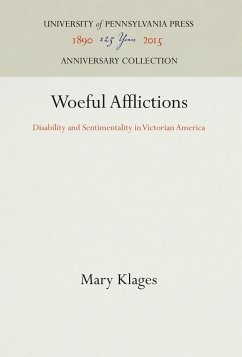From Tiny Tim to Helen Keller, disabled people in the nineteenth century were portrayed in sentimental terms, as afflicted beings whose sufferings afforded ablebodied people opportunities to practice empathy and compassion. In all kinds of representations of disability, from popular fiction to the reports of institutions established for the education and rehabilitation of disabled people, the equation of disability and sentimentality served a variety of social functions, from ensuring the continued existence of a sympathetic sensibility in a hard-hearted, market-driven world, to asserting the selfhood and equality of disabled adults.
Unique in its focus on blindness and its examination of the interplay between institutional discourse and popular literature, Woeful Afflictions offers a detailed historical analysis of the types of cultural work performed by sentimental representations of disability in public reports and lectures, exhibitions, novels, stories, poems, autobiographical writings, and popular media portrayals from the 1830s through the 1890s in the United States.
Woeful Afflictions combines contemporary scholarship on sentimentalism with the most recent works on the cultural meanings of disability to argue that sentimentalism, with its emphasis on creating emotional identifications between texts and readers, both reinforces existing associations between disability and otherness and works to rewrite those associations in portraying disabled people, in their emotional capacities, as no different from the ablebodied. This book will interest anyone concerned with disability studies and the social construction of the body, with the history of education and of publicinstitutional care in the United States, and with autobiographical writings.
Unique in its focus on blindness and its examination of the interplay between institutional discourse and popular literature, Woeful Afflictions offers a detailed historical analysis of the types of cultural work performed by sentimental representations of disability in public reports and lectures, exhibitions, novels, stories, poems, autobiographical writings, and popular media portrayals from the 1830s through the 1890s in the United States.
Woeful Afflictions combines contemporary scholarship on sentimentalism with the most recent works on the cultural meanings of disability to argue that sentimentalism, with its emphasis on creating emotional identifications between texts and readers, both reinforces existing associations between disability and otherness and works to rewrite those associations in portraying disabled people, in their emotional capacities, as no different from the ablebodied. This book will interest anyone concerned with disability studies and the social construction of the body, with the history of education and of publicinstitutional care in the United States, and with autobiographical writings.








